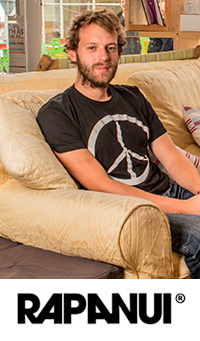"When you buy cheap clothing on the highstreet, you are actively voting with your wallet to financially support sweatshops. Consumers simply need an eco label."
Rob Drake-Knight, Co-Founder, Rapanui
 Rapanui is an eco-fashion brand in itself. It has made eco-friendly clothing and advocated its sale and use all over the world from the beginning. The company designs and makes eco-friendly clothing from sustainable materials. It practices sustainable fashion in the truest of senses.
Rapanui is an eco-fashion brand in itself. It has made eco-friendly clothing and advocated its sale and use all over the world from the beginning. The company designs and makes eco-friendly clothing from sustainable materials. It practices sustainable fashion in the truest of senses.
You take extensive sustainability measures to ensure that your products are produced ethically. Can you talk a bit about your sustainability programme, from seed to shop?
Yes, sustainability is at the core of what we do here at Rapanui, so we’ve taken a complete approach from product to supply chain and communication. In short we make clothing just like the highstreet but from more sustainable materials, we use organic cotton, bamboo and eucalyptus fabrics, and make sure that throughout our supply chain we operate ethically. There’s more to sustainability than just people and fabrics though, and we use factories that are powered by renewable energy.
I guess, the thing that really makes us different is not just our products but the way that we sell them. In 2010, we developed the world’s first traceability programme, with complete transparency across our supply chain for every single product line via individual interactive supply chain maps. We also developed an award winning eco labelling system which allows consumers to quickly and easily sum up the eco friendliness of a product and shop quickly with a conscience.
Sustainability at Rapanui is at the centre of everything we do.
What are sweat shops and why is it important to have sweat-shop-free clothes?
Sweat shops are unacceptable. They produce incredibly low cost garments in unclean, unsafe and unethical working conditions, often employing the services of children for little or paltry wages. It is important for western consumers to pay the right price for garments that have been made ethically. When you buy cheap clothing on the highstreet, you are actively voting with your wallet to financially support sweatshops. Consumers simply need an eco label like ours, so they can take responsibility for the products that they buy. In the UK, we’ve seen mass change in buyer behaviour after campaigns to change marketing communication and public awareness of food production; now it’s time to do the same with clothing.
How can corporate houses ensure that their textile products are produced ethically? Do you suppose that corporate houses around the world are following this practice?
It’s tricky but certification is a great way. Certifying bodies’ audit factories are much better placed to ensure that supply chains are following good practice than brands. I think that things have changed for the better recently, but the only way for that is consumers can see that the reality is with traceability and proper labelling. Certifications are only a part of the story.
What certifications have you obtained in terms of sustainability? Please elaborate.
The factories that we source our garments from are always fully certified in materials (organic certifications - GOTS, etc.), ethical manufacture (labour standards – Fair Wear, Fair Trade), and energy consumption (wind made). A mix of all of these certifications guarantees a well rounded sustainability programme.
More Insights...





 Rapanui is an eco-fashion brand in itself. It has made eco-friendly clothing and advocated its sale and use all over the world from the beginning. The company designs and makes eco-friendly clothing from sustainable materials. It practices sustainable fashion in the truest of senses.
Rapanui is an eco-fashion brand in itself. It has made eco-friendly clothing and advocated its sale and use all over the world from the beginning. The company designs and makes eco-friendly clothing from sustainable materials. It practices sustainable fashion in the truest of senses.